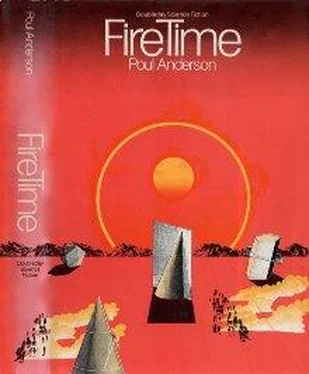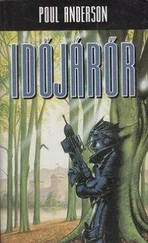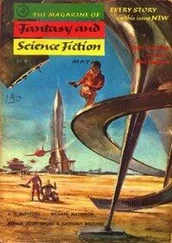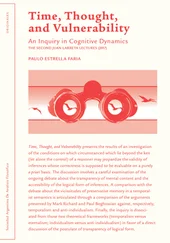Its red glower, low above northern hills which it turned amethyst, was near setting. The Sun stood high and brilliant. Double shadows and blended hues made the landscape strange. It rolled gently away from either bank of the river. This shore was given over to human cultivation. Wheat, corn, and the rest had been harvested, leaving stubblefields; but apples flushed in an orchard, homed fourlegged animals chewed grass behind fences—how green everything was! The opposite side remained native: turf of golden-hued lia studded with scarlet firebloom, trees in coppices tawny (swordleaf) or ocherous (swirlwood and leatherbark) Wingseed birches were propagating yonder, and many pods flapped across the stream before they ran out of stored energy and fell to the ground. Nature’s carelessness: they could no longer take root over here; the soil had been changed too much.
The breeze into which they beat was pleasant after the morning’s sultriness. Larreka heard his mane rustle. He drank the sweet weird odors of Earthside growth with an appreciation learned through a hundred years. The grimness of his present mission didn’t lessen that. A soldier shouldn’t let worry spoil whatever bonuses life tossed his way.
“How much further, sir?” asked one of the half-dozen males at his back. They weren’t needed in these closely settled, food-rich parts. But it had expedited the trek across North Beronnen and over the Thunderhead Mountains, to have some who could be detached to hunt and forage while the rest kept going, and extra hands for camp chores. Larreka figured he might as well let them come the whole way to Sehala and its fleshpots. Poor bastards, they wouldn’t get a lot of fun during their youth. He who had spoken was a native of Foss Island in the Fiery Sea, recruited there and posted directly to Valennen because that was where the Zera was stationed these years. He had never before visited the mother continent.
“Chu, maybe an hour.” Larreka used a unit denoting the sixteenth part of a noon-to-noon, coincidentally quite near to the Earth measurement. “Keep moving. I told you we’ll overnight there.”
“Well, at least Skeela’ll soon be down.”
“Huh?—Oh. Oh, yes.” With as many names as he had heard for the red orb, Larreka could generally spot another.
He himself thought of it as the Rover, since he belonged to the Triadic cult. There it was central, together with the Sun and that Darkness on whose brow smolders the Ember Star. As a youth in Haelen, he had called it Abbada, and had been told it was an outlaw god who returned every thousand years; later he became skeptical, and considered the pagan rites of propitiation a waste of good meat. The barbarians of Valennen were in such awe of the thing that they gave it no name whatsoever, Just a lot of epithets, none of which should be used twice in a row lest its attention be drawn to the speaker. And so the business went, different everywhere, including among the humans. They called the red one Anu, and denied a soul of any kind was in it; and likewise for the Sun, which they called Bel, and the Ember Star, which they called Ea.
In many ways, their concept was the creepiest of the lot. Larreka had had to nerve himself to master their teachings. He couldn’t yet believe that there was nothing to the Triad but fire. And whether or not that was the case, he’d carry out the rites and commandments of his religion. It was a good faith for a soldier, popular in the legions, excellent for morale and discipline.
From the outside, Larreka didn’t look like a person who would study philosophy. He might have been a veteran sergeant, slightly undersized but heavily muscled, less graceful than most though exceedingly fast when needful. Wounds deep enough to leave permanent scars had seamed his body in places; a gouge crossed the bone of his brow, and his left ear was missing. Haeleners being of South Beronnen origin, he had skin formerly pale brown, turned dark and leathery by many weathers, wherein his eyes stood ice-blue. His speech kept traces of a rough homeland accent, and his most conspicuous weapon—practically his trademark—was the heavy knuckleduster-handled curve-bladed shortsword favored in that antarctic country. Otherwise he wore only a purse-belt for small articles, and the arms and travel kit strapped in a bundle on his back or loaded in two wicker panniers. This included a hunting spear and a hatchet which could double as a weapon. Nothing was ornamented; it was well-worn cloth, hide, wood, steel. His sole jewelry was a gold chain around the thick left wrist.
The soldiers behind him were gaudier, sporting plumes, beadwork, jingling links. They were also very respectful of their shabby leader. Larreka, Zabat’s son of Clan Kerazzi, was perhaps the most demanding of the thirty-three legionary commandants. After two centuries in the Zera, he was far into middle age, three hundred and ninety on his last birthday. But he could expect another hundred years of health, and might well hope for more—if a barbarian didn’t get him first, or any of the natural catastrophes the Rover was brewing for the world.
It slipped under the horizon. For a brief while, clouds to the north were sullen from its rays. Then the sane light of the Sun shone free. Cumulus loomed tall and white above a blue shadowiness hinting at storm.
“Think it’ll rain, sir?” asked the male from Foss Island. “I sure wouldn’t mind.” Though near the equator, his home was refreshed by winds off the sea. Here he felt hot and dusty.
“Save your thirst for Primavera,” Larreka advised. “The beer there is good.” He squinted. “N-n-no, I wouldn’t look for rain today. Tomorrow, maybe. Don’t be in a fume about it, son. You’ll soon get more water hereabouts than you can handle, enough to drown a galleyfish. Maybe then you’ll appreciate Valennen better.”
“I doubt that,” a companion said. “Valennen’s supposed to go even drier than it futtering well already is.”
“Futtering ain’t the word, Saleh,” a third put in with a crow of laughter. “Female pelts’ll get baked so stiff you could sand a hole in your belly.”
His exaggeration was moderate. Loss of moisture did coarsen the mat of fine green plant growth covering most of a body. “Why, as for that,” Larreka said, “heed the voice of experience,” and described alternate techniques in blunt language.
“But, sir,” Saleh persisted, “I don’t get it. Sure, Valennen sees a lot more of the Wicked Star, a lot higher in the sky, than Beronnen does. I understand how it gets hotter than here. Only why’ll the country dry out that bad? I thought, ng-ng, I thought heat draws water out of the sea and dumps it as rain. Isn’t that how come the tropical islands are mostly wet?”
“True,” Larreka answered. “That’s what’s going to spill rain all over Beronnen for the next sixty-four years or more, till we’re in mud up to our tail-roots when we aren’t flooded out—not to speak of snowpack melting in the highlands and whooping down, to add to the fun and games. But Valennen’s saddled with those enormous mountains along the whole west coast, where the main winds come from. What little water the interior’s got will blow away eastward over the Sea of Ehur, while clouds off the Argent Ocean crash on the Worldwall. Now shut your meat hatch and let’s tramp.”
They sensed that he meant it and obeyed. For some reason he recalled a remark which Goddard Hanshaw had once made to him:
’’You Ishtarians seem to have such a natural-born discipline that you don’t need any spit-and-polish—hell, your organized units like in the army hardly seem to need any drill. Only, is ‘discipline’ the right word? I think it’s more a, well, a sensitivity to nuances, an ability to grasp what a whole group is doing and be an intelligent part of it… Okay, I reckon we humans catch on faster to certain ideas than you do, concepts involving three-dimensional space, for instance. But you’ve got more, uh, a higher social IQ.” He had grinned. “A theory unpopular on Earth. Intellectuals hate to admit that beings who have wars and taboos and the rest can be further evolved than their own noble selves, who obviously have none.”
Читать дальше












